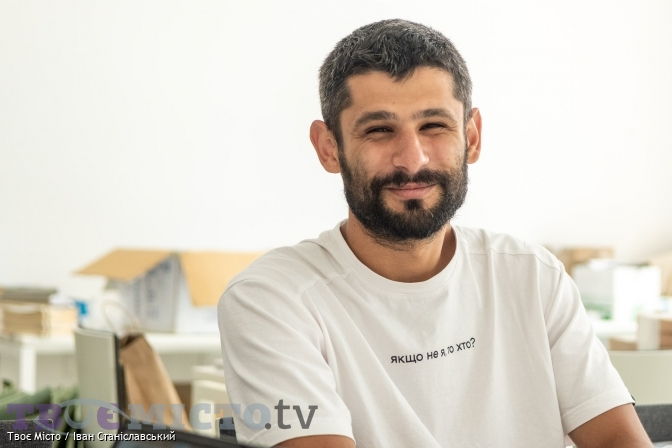
[For urgent updates please follow Ukrainian Freedom News on Telegram]
Since 2014, the volunteer movement «Building Ukraine Together» (BUR) has been engaged in the restoration and construction of private housing in front-line areas. Volunteers create public spaces and currently build houses for internally displaced persons. Almost 5 thousand people are involved in the movement, having built and restored up to 300 buildings in different regions of Ukraine in eight years. We spoke with Yurko Didula, one of the BUR founders, about the volunteer movement and how his family is involved in helping the front.
- Tell us more about BUR, when and how did it arise?
I am a graduate of Ukrainian Catholic University (UCU), where we’ve always been «drilled» as active citizens who should solve various social problems. Back in our student years, we started organizing actions aimed at establishing communication within the country. We felt that young people from the east and west of Ukraine did not communicate much, and there were many prejudices and stereotypes. Hence, we came up with the campaign «Easter together» in 2010, and implemented it in 2011.
This was my first public volunteer work. When 150 people from the Donetsk, Luhansk and Odesa regions came to us for the first time, we communicated well and began to realize how often we all had been misled and manipulated. Then I realized that building social connections between people who previously had no opportunity to communicate is vital for the country. I often refer to the words of UCU professor Yaroslav Hrytsak that a nation is a communication, and without communication, there is no nation.
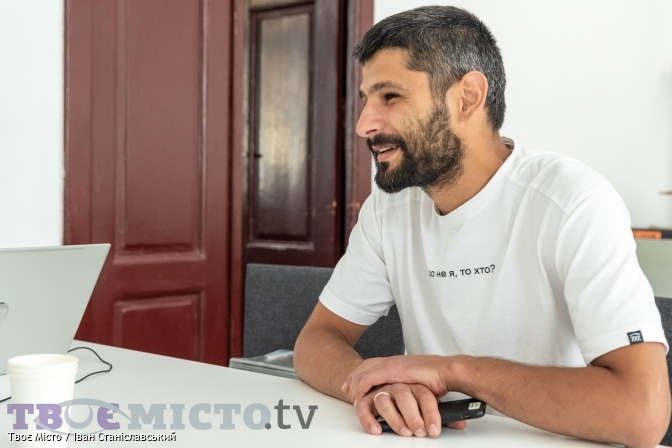
We built these social ties, and after UCU I went to the United States, worked a little in the field of democracy development, gained experience in the public sector and realized that I would like to do this in Ukraine, to develop democratic institutions. After coming back, I got acquainted with Jeffrey Wills, one of the founders of the Lviv Educational Foundation, and joined their activity. In July 2014, we went to Kramatorsk together. It was a week after the liberation of this town, just to see what the situation was like there, the extent of the destruction, the ordinary citizens and how the public sector could help. We understood that the state did not have time to do everything and had other priorities, because then the war was in its active stage. Some people worked with medicines, some with the army, others – with displaced persons. We took on this humanitarian mission and went to Kramatorsk to rebuild destroyed apartments and houses.
Read also: «State would have to support the volunteers.» Public activist Sviatoslav Litynskyi on criminal cases
It was very important for us to see the reaction of the local residents. Initially, they mistrusted us because during the two months of occupation, they received messages from the «DNR» fighters about «Nazis» who would come and Ukrainize the locals. However, when we repaired several apartments, this barrier immediately collapsed.
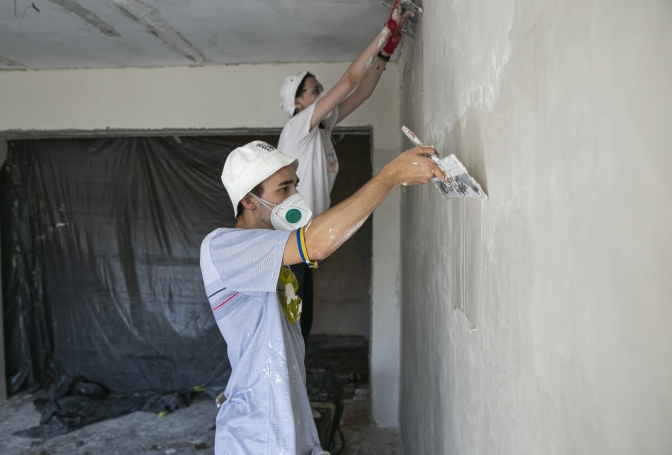
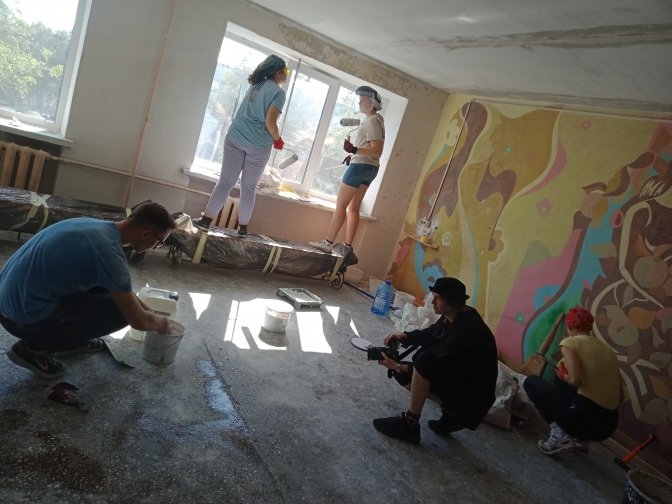
People there are very practical and specific. If they see that the guys did it, then these are good guys. Therefore, they invited us for varenyky [Ukrainian dumplings with potato] and switched to Ukrainian when communicating with us. We realized that, in addition to rebuilding several apartments, we created the effect of destroying stereotypes by establishing communication, and demonstrated solidarity, which is crucial for the locals and for us. We didn’t know the young people from Kramatorsk or Sloviansk well, but when we sat by the fire after a hard day’s work, we spoke the same language.
It was a very important awareness of national identity and views of the future. Building and investing in the country – this is how the idea of «Building Ukraine Together» was born.
- Who did you go with for the first time? Were these students?
No. Initially, the four of us went with the employees of the Lviv Educational Foundation (now, it is named a Ukrainian educational platform). Vitalii Kokur was its director, he had experience in engineering and construction, so accompanied the entire construction process. Andrii Levytskyi, my friend from UCU, who took over a chairman’s position in Student Brotherhood at UCU, a year after we had founded it. There was also his brother, Taras. But after that, we already came there with the camp, and there was a slightly wider circle of us: my dad, brother, uncle, our friends from UCU and «Plast» scouts.
However, it was a wider circle of a narrow one. We did not really open a recruiting campaign, because it was a period when the front was quite close, and not many people were willing to go. But when we already organized the first camp, some feedback started coming in: people started contributing financially, and we already came up with the name and logo. It is such a very specific work that gave people a sense of usefulness at the time.
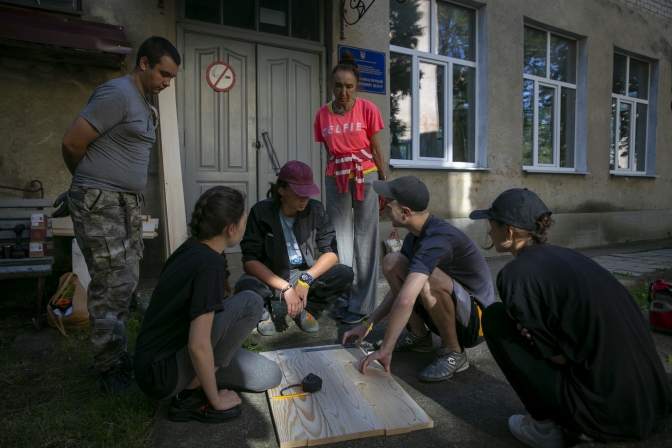
- This was the first camp. Since 2014, how many of these camps have you organized? In which cities and how many people have been reached, involved, what is the current number of participants in the organization?
Now we are organizing the hundredth camp in Voznesensk, Mykolaiv region. This, accordingly, is the hundredth community we have visited. But each community has a different number of arrivals. For example, if we were in Kramatorsk for four weeks at first, then there were four races, and we were in Pavlograd once in 2016 for only a week.
In total, since the establishment of BUR, 182 volunteer races have taken place, and almost 300 people have been part of local teams of our camp in their city. To summarize, we can say that we camped for almost 1500 days.
In total, over these eight years, we were joined by 4.5 thousand volunteers. We restored 270 houses and created 58 youth and public spaces. Since the start of the full-scale invasion, we’ve already been rebuilding larger infrastructure, such as dormitories. Recently, up to 300 people have settled in one of them. Volunteers usually come from the Lviv, Kyiv and Donetsk regions.
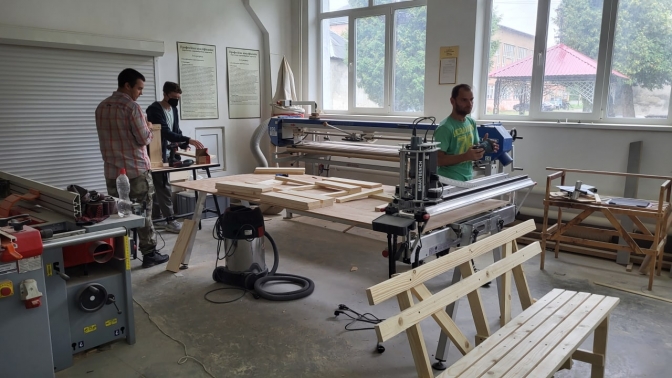
- Where do you get the money for all this?
Initially, we had a unique funding model. We have serious partners, such as USAID, the American Agency for International Development, we have the state of Ukraine as a partner. For five years, we’ve been working with the Ministry of Youth and Sports, which finances our camps. Ukrainians in emigration and the organization «Together for Ukraine» also support us a little. In particular, Ukrainians in the United States often support us with contributions. Still, the main thing is that we have almost 300 people in Ukraine, ordinary citizens, our former volunteers, who signed up for a monthly contribution and send some 100, 500, or 1000 hryvnias. In addition, we interact with businesses. In every community where we do something, we try to attract business either with discounts, materials, or food, and often cover up to 20-30% of camp costs through local participation.
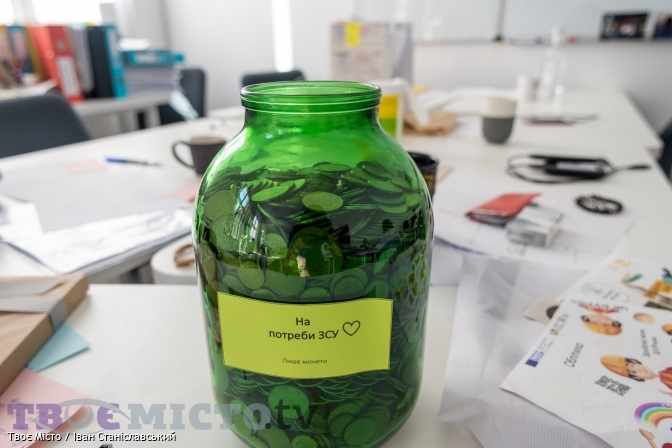
- Regarding the BUR camps: do Lviv residents come and rebuild the cities, or do you involve local communities in this process?
It happens in different ways. We have camps where up to 25 volunteers from other regions of Ukraine come. If the camp takes place in Voznesensk, then people from the west, center and south can come. If the camp is in Lviv, if we restore some space for displaced people, then people come from the centre and from the east arrive.
In addition, we also have local BUR units. Our former volunteers unite in teams and organize volunteer activities in their cities. Now, for example, there is a community near Lviv that wants to accept refugees. They found a house, and our Lviv branch is gathering a team of local volunteers who will repair and restore this house during the week. There will be no «external» volunteers, only Lviv residents.
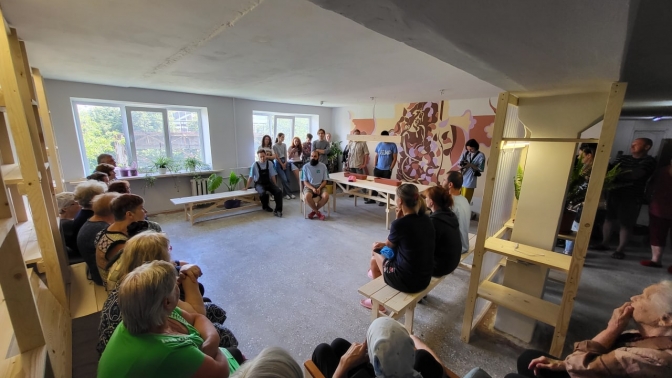
In general, the idea of BUR-camps is to gather representatives of at least 12-15 regions during one visit in order to establish internal communication in the country. So that people living in Lviv have social ties with people from Mykolaiv, Odesa, Kharkiv. To make these ties alive, and encourage people to do some joint projects.
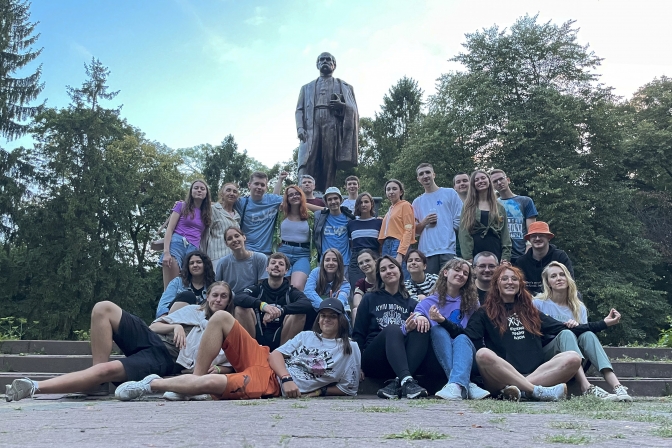
- How does this selection for BUR camps take place? Do those who want to participate send you applications or do you solicit your friends and acquaintances?
We’re already at the stage where there are not enough friends and acquaintances to organize all the camps. Now, we have up to six or even eight different camps going on at the same time in different locations. This means that we need to find 100-120 people ready to go. But we have a big goal – to involve the maximum number of Ukrainians in the process of rebuilding Ukraine. If not us, then who?
We have a communications department that deals with recruiting and targeted advertising. At one time, we had an ambassadorship institute – volunteers who participated in camps and are passionate about the idea of volunteering with BUR. They went to universities, colleges, other communities and presented BUR, told why volunteering is cool and why it is important. We launched tiktok, instagram, all social networks, all videos. The visual image is important because people understand that it’s something interesting, something new.
Last year, we had a recruiting campaign under the slogan «Try something new». Many people respond to it. We had billboards depicting a dude with a putty knife and a QR code, and many people followed the link.
But if we are talking about local volunteers, it’s more difficult to attract them, because the communities in which we work are quite small, such as the Burshtyn one. We are creating a BUR camp there. In order to attract local youth to volunteering, we brought them Viktor Vynnyk, the frontman of the rock band «MERI».
We made a concert and integrated BUR camp advertising into it. Like, «such a party will take place in the town, join in». 100 people came to the concert. Of them, 10 registered to participate in the camp. But for us, even those 10 who participate in the reconstruction of some object in their city is already a cool result. In addition, we tried to involve local leaders of public opinion – teachers, public organizations, public centres and so on.
- How do you choose the communities to which you will go? Is there a request from local residents or does it happen randomly?
Since 2017, we’ve been travelling only at the invitation of the local community. We want people to understand what BUR is. That it’s not just about coming, making repairs and leaving, but about creating a community in the city, about youth development and responsibility.
This year, we had exceptions. We understand that there are few people left in the destroyed Irpin or in some villages of the Chernihiv region, who would be ready to think about inviting a BUR camp and developing youth.
We will create a camp in Irpin because we want to help there. Or in the Chernihiv region, together with the volunteer initiative «Repair Together», we are restoring the village of Lukashivka. 12 objects have already been built there. We were not invited there, so we came with our own intention.
- Has your life changed before and after February 24? If so, how did it happen exactly?
Nothing has changed regarding work. BUR always had quite big ambitions, we took on a lot of work. There was a month after the full-scale invasion where we were working around the clock, maybe even two months.
In addition to BUR, I am engaged in the provision of the Armed Forces. I have a specific part that I take care of, I attract funds. This is the Territorial Defense of the Luhansk Region. There are guys from Svatovo, Rubizhne, Severodonetsk who became volunteer fighters before and after the full-scale invasion, and now guys from Cherkasy and Dnipro have joined this unit. This is a group of people from different regions, but together they constitute the Territorial Defense of the Luhansk Region.
From the first days of the war, we did not engage in BUR [camps], but resettled displaced persons, collected humanitarian aid for the communities that suffered in the east. But 90% of our focus – both financial and human – was the Armed Forces. We sent almost 50 vehicles to the front, up to 100 thermal imagers, 400 handheld transceivers, up to 300 body armour and helmets. In total, this is almost half a million dollars worth of military equipment. It was quite a large-scale direction until May – mid-June. Then, we began to return to the usual rhythm and organized camps again. Since then, a dormitory has been restored in Ivano-Frankivsk and Stryi. We are restoring the one in Kolomyia, a school has been restored in Motyzhyn, and part of the emergency department in Makariv.
- What about the Lviv region?
In the Lviv region, we are now finishing work in Dovhe Hirske. This is a village near Drohobych. We are helping the «Caritas» team there to create a space for internally displaced persons, and are also finishing a floor in Drohobych, where up to 80 people will live. We are finishing a dormitory in Stryi, as well as a whole floor for refugees. Two interesting projects are starting in Lviv. The Rubizhe hosiery factory moved here. The investment department of the city council helped the enterprise find housing in one of the hostels, and we will be partners, we will bring this hostel into order with the Lviv community of volunteers. Another interesting project with our participation: the Kharkiv street culture team moved to Lviv, and the city gave them a long-term lease of the «LORTA» shopping centre on Patona street. A huge space of 5000 square meters, where they create a whole ecosystem for refugees, so that it’s possible to work and develop, study and live there.
- How do your relatives help the front? After all, the Didula family is well-known in Lviv.
Everyone is doing something related to war. My sister Marta works at «Care in Action» – an organization that deals with the settlement of refugees, has organized several points, hostels, and hostels in Lviv that accept displaced people, provide a little support, help with further relocation, or actively work with them here.
Hannusia has a boyfriend at the front, so her field of volunteer activity is the provision of the Armed Forces. She and her friends organized the «BlagoChill» charity festival and collected more than 200 thousand hryvnias to buy two drones for the military unit. Halya worked together with me, and also assisted the children of refugees. Our dad is on the information front, creates various inspiring stories about people who do something useful for Ukraine, conveys the truth to Ukrainian and foreign viewers. Pavlo, my brother, opened a space in the village of Navaria, where he receives people on a subsidized basis, and also works on the video with an American director. These are stories about organizations and movements that help Ukraine. And mom makes sure that we can all maintain doing what we do.
- Tell us more about «Vilna Khata» («Free House»).
«Vilna Khata» is a youth centre. People do not live there, it can be said that it’s a centre of informal education and cultural development. It is often called the «third place», because the first one is the family, the second is the school, and the third is where you can get an opportunity for personal development in an informal gathering.
In 2014, in Kramatorsk, we created the first youth centre in Ukraine, which was not a communal or state one. Young people who had nowhere to spend their leisure time simply gathered there. That is, we created «Free House» as the first case, when the youth themselves created a space for leisure, development and socializing.
It went so well that «Vilna Khata» was on the lips of the whole country. Many journalists came to us, this story was spread, and it became a rather unnatural trend in Ukraine. A lot of people started creating youth centres from grassroots initiatives, because it’s cool, and we helped them. BUR and I created 43 youth centres in Ukraine, which are still functioning. Now, they have taken on a humanitarian mission. But in addition to those created by us «from the bottom up», the state took this as a trend and began to create youth centres according to the directive «from the top down».
For example, the governor of the Donetsk region gave an order to create 150 youth centres in two years. They were created like mushrooms after the rain. More than half closed because they appointed some old woman as an administrator, and the centre is empty, there is no filling. But in general, there are up to 250 cool youth centres in Ukraine that I know.
- Which city do you remember the most?
Podilsk (formerly Kotovsk), Kramatorsk, Berdyansk, Mariupol. In Mariupol, we helped create a powerful youth centre «Caravan». One of its founders and leaders is currently in captivity. A youth centre was created in Severodonetsk, Rubizhne, and Svatove.
Still, I remembered Kramatorsk the most. It became my hometown, my second home.
- Why is it important to do what you do?
We dream of Ukraine, where people help each other, participate in public life, at least 30 percent of them have an active position. Where they do not just go to the elections, but donate to some party, support some public organization because it solves some problems that disturb people, participate in some advocacy campaigns, and volunteer regularly.
BUR is just the tool that enables people to get to know each other and work together, which gives you the opportunity to feel that this is your city, your country, for which you have done something. You want to live and to work there.
Volunteers often tell us that thanks to BUR, they learned to feel that Ukraine is their country, that they don’t just live here, but want to study and work here further.
Text: Roman Tyshchenko-Lamanskyi, translated by Vitalii Holich
Photo: Ivan Stanislavskyi
Full or partial republication of the text without the written consent of the editors is prohibited and considered a violation of copyright.
Follow us on Facebook and Instagram. Lviv Now is an English-language website for Lviv, Ukraine’s «tech-friendly cultural hub.» It is produced by Tvoe Misto («Your City») media-hub, which also hosts regular problem-solving public forums to benefit the city and its people.



